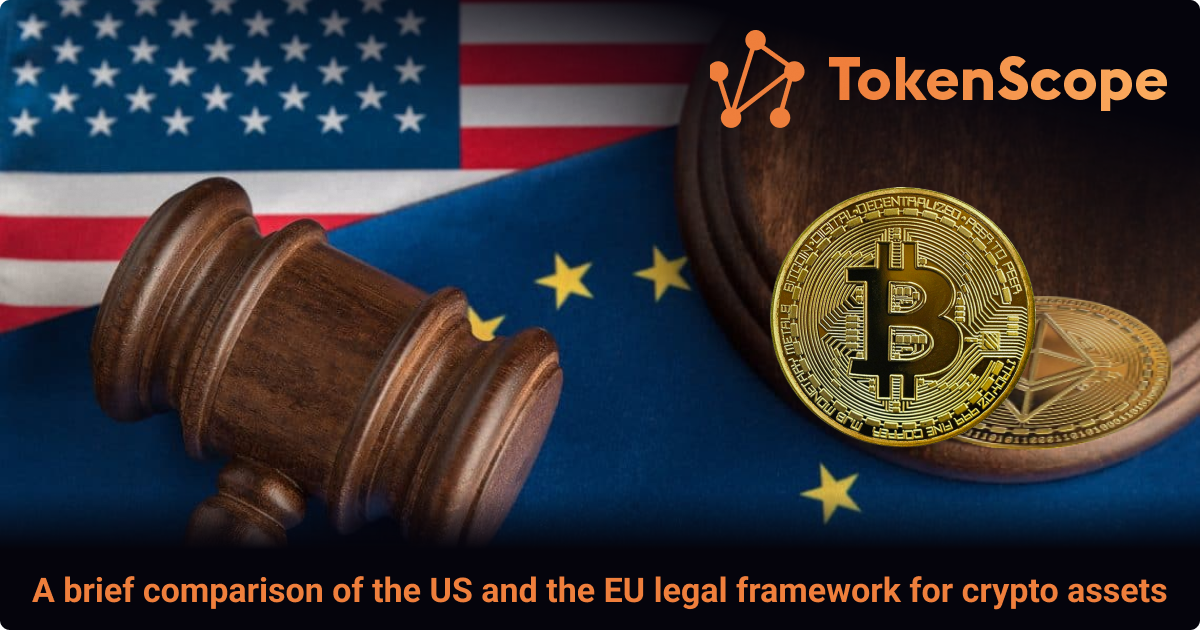A brief comparison of the US and the EU legal framework for crypto assets

The EU has long been competing with the US to attract the world's leading cryptocurrency companies and seems to be winning. In the U.S., despite many attempts, still no transparent crypto regulation has been created, and attacks by local regulators on crypto firms are forcing them to look for a new place to operate. And the EU seems to be the right place for this move.
The EU and the US have different legal frameworks for regulating cryptocurrencies. The EU has adopted a comprehensive package of legislative proposals for the regulation of crypto-assets, including the Markets in Crypto Assets regulation (MiCA), but the US bill for crypto assets didn’t have any chance to pass the Senate.
MiCA requires crypto firms to be authorized by the EU to serve customers in the bloc and to comply with safeguards against money laundering and terrorism financing. The EU has also endorsed the first EU rules to trace crypto-asset transfers, prevent money laundering, as well as common rules on supervision and customer protection. This includes a harmonized EU-level legal framework governing the structure to conduct in European crypto asset markets, addressing issues ranging from transparency, disclosure, authorization, and supervision of transactions.
On the other hand, the US has several federal agencies, including the Securities and Exchange Commission (SEC), the Commodity Futures Trading Commission (CFTC), the Federal Trade Commission (FTC), and the Department of the Treasury, that oversee crypto companies. However, little formal rulemaking has occurred, and many federal agencies and policymakers have praised the technology as being an important part of the US's future infrastructure. The US is still working towards creating an efficient set of digital asset regulations.
The SEC is leading the push to subject cryptocurrency markets to the full spectrum of financial regulations the agency oversees. The SEC has also urged increased enforcement of financial regulations for stablecoins and other crypto tokens. From the other hand, the CFTC's jurisdiction is implicated when a virtual currency is used in a derivatives contract, or if there is fraud or manipulation involving a virtual currency traded in interstate commerce. The lack of comprehensive regulation and different positions of government agencies create uncertainty in the U.S. cryptoasset market and hinder its development.
As we see, the EU has a more comprehensive regulatory framework for digital assets than the US. Nevertheless, the U.S. continues to work on creating crypto regulation and lawmakers are currently considering several bills related to cryptocurrency at once.
-
The Lummis-Gillibrand bill that grants oversight responsibility for most forms of cryptocurrency to the CFTC. It envisions a much-reduced role for the SEC in regulating this asset class. The bill would grant exclusive jurisdiction to the CFTC to regulate transactions involving “crypto assets,” which are defined as electronic.
-
The CANSEE Act that would end special treatment for DeFi by applying the same national security laws that apply to banks and securities broker.
-
The Warren-Marshall-Manchin-Graham bill: This bipartisan bill aims to crack down on crypto's use in money laundering, drug trafficking, and sanctions evasion. It is considered the toughest proposal on the table.
There are also several other bills related to crypto regulation under consideration in the US Senate. For example, a flurry of activity took place in Congress from July 26 to July 28 as lawmakers worked on first-of-their-kind stand-alone crypto bills before the legislature’s August recess. One of the topics discussed was whether the SEC or CFTC should be the primary regulator for crypto spot markets.




